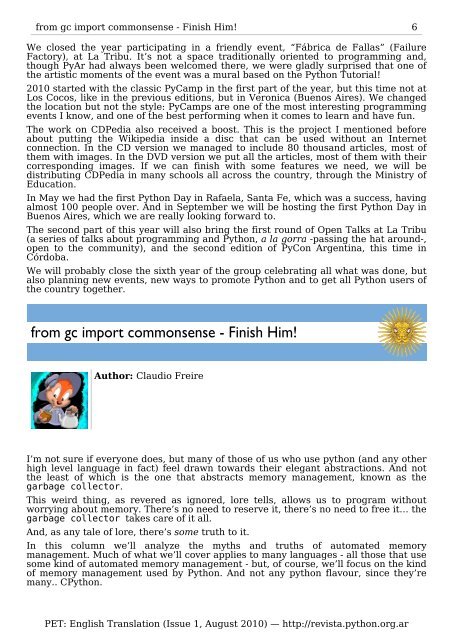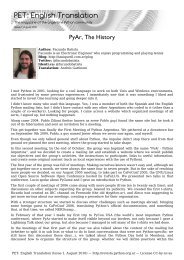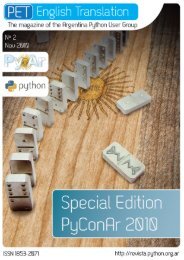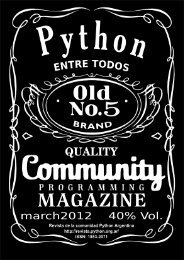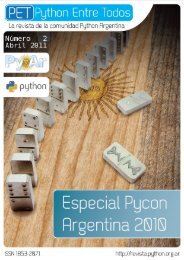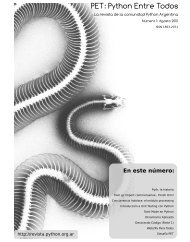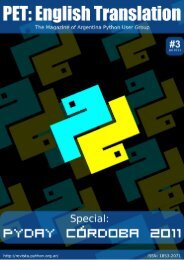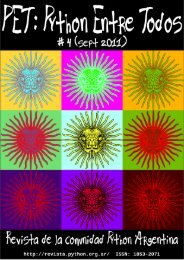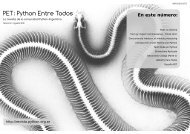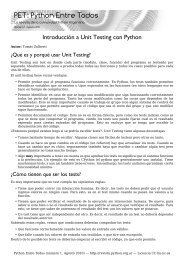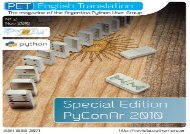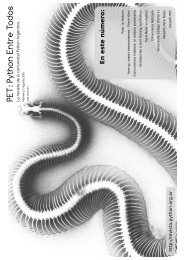A4 portrait - PET: Python Entre Todos - Python Argentina
A4 portrait - PET: Python Entre Todos - Python Argentina
A4 portrait - PET: Python Entre Todos - Python Argentina
Create successful ePaper yourself
Turn your PDF publications into a flip-book with our unique Google optimized e-Paper software.
from gc import commonsense - Finish Him! 6<br />
We closed the year participating in a friendly event, “Fábrica de Fallas” (Failure<br />
Factory), at La Tribu. It’s not a space traditionally oriented to programming and,<br />
though PyAr had always been welcomed there, we were gladly surprised that one of<br />
the artistic moments of the event was a mural based on the <strong>Python</strong> Tutorial!<br />
2010 started with the classic PyCamp in the first part of the year, but this time not at<br />
Los Cocos, like in the previous editions, but in Veronica (Buenos Aires). We changed<br />
the location but not the style: PyCamps are one of the most interesting programming<br />
events I know, and one of the best performing when it comes to learn and have fun.<br />
The work on CDPedia also received a boost. This is the project I mentioned before<br />
about putting the Wikipedia inside a disc that can be used without an Internet<br />
connection. In the CD version we managed to include 80 thousand articles, most of<br />
them with images. In the DVD version we put all the articles, most of them with their<br />
corresponding images. If we can finish with some features we need, we will be<br />
distributing CDPedia in many schools all across the country, through the Ministry of<br />
Education.<br />
In May we had the first <strong>Python</strong> Day in Rafaela, Santa Fe, which was a success, having<br />
almost 100 people over. And in September we will be hosting the first <strong>Python</strong> Day in<br />
Buenos Aires, which we are really looking forward to.<br />
The second part of this year will also bring the first round of Open Talks at La Tribu<br />
(a series of talks about programming and <strong>Python</strong>, a la gorra -passing the hat around-,<br />
open to the community), and the second edition of PyCon <strong>Argentina</strong>, this time in<br />
Córdoba.<br />
We will probably close the sixth year of the group celebrating all what was done, but<br />
also planning new events, new ways to promote <strong>Python</strong> and to get all <strong>Python</strong> users of<br />
the country together.<br />
from gc import commonsense - Finish Him!<br />
Author: Claudio Freire<br />
I’m not sure if everyone does, but many of those of us who use python (and any other<br />
high level language in fact) feel drawn towards their elegant abstractions. And not<br />
the least of which is the one that abstracts memory management, known as the<br />
garbage collector.<br />
This weird thing, as revered as ignored, lore tells, allows us to program without<br />
worrying about memory. There’s no need to reserve it, there’s no need to free it… the<br />
garbage collector takes care of it all.<br />
And, as any tale of lore, there’s some truth to it.<br />
In this column we’ll analyze the myths and truths of automated memory<br />
management. Much of what we’ll cover applies to many languages - all those that use<br />
some kind of automated memory management - but, of course, we’ll focus on the kind<br />
of memory management used by <strong>Python</strong>. And not any python flavour, since they’re<br />
many.. C<strong>Python</strong>.<br />
<strong>PET</strong>: English Translation (Issue 1, August 2010) — http://revista.python.org.ar


